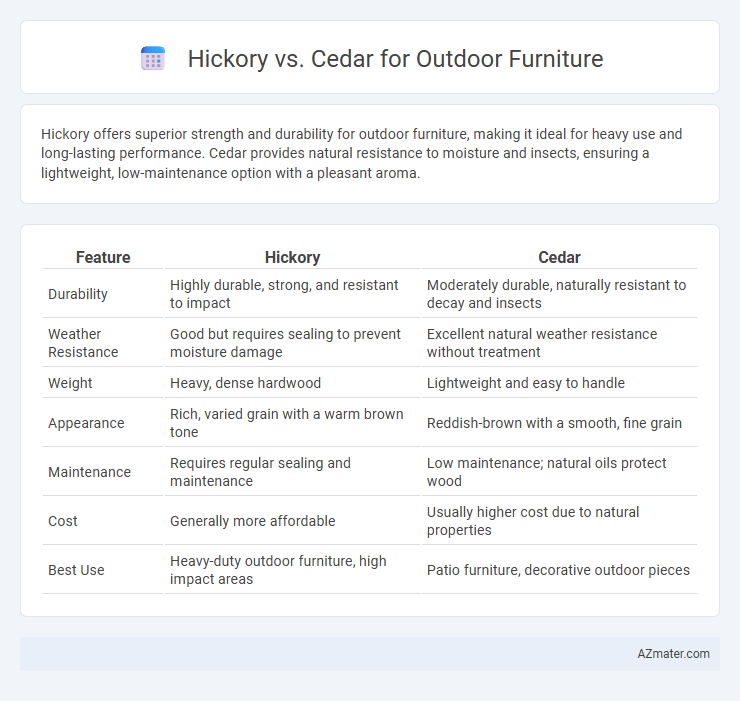Hickory offers superior strength and durability for outdoor furniture, making it ideal for heavy use and long-lasting performance. Cedar provides natural resistance to moisture and insects, ensuring a lightweight, low-maintenance option with a pleasant aroma.
Table of Comparison
| Feature | Hickory | Cedar |
|---|---|---|
| Durability | Highly durable, strong, and resistant to impact | Moderately durable, naturally resistant to decay and insects |
| Weather Resistance | Good but requires sealing to prevent moisture damage | Excellent natural weather resistance without treatment |
| Weight | Heavy, dense hardwood | Lightweight and easy to handle |
| Appearance | Rich, varied grain with a warm brown tone | Reddish-brown with a smooth, fine grain |
| Maintenance | Requires regular sealing and maintenance | Low maintenance; natural oils protect wood |
| Cost | Generally more affordable | Usually higher cost due to natural properties |
| Best Use | Heavy-duty outdoor furniture, high impact areas | Patio furniture, decorative outdoor pieces |
Hickory vs Cedar: Overview and Key Differences
Hickory and cedar differ significantly in durability and appearance, with hickory offering exceptional hardness and strength, making it highly resistant to dents and wear, while cedar is prized for its natural resistance to rot, insects, and weathering due to its aromatic oils. Hickory exhibits a dense grain and a varied brown color that darkens with age, whereas cedar presents a lighter, reddish hue with a straight grain that weathers to a silvery patina over time. Outdoor furniture crafted from hickory requires more maintenance to protect against moisture damage, while cedar's natural oils provide low maintenance and excellent longevity in outdoor conditions.
Durability and Strength Comparison
Hickory outdoor furniture boasts superior durability with its dense, resilient hardwood structure, making it highly resistant to wear and impact. Cedar offers natural resistance to rot and insect damage due to its aromatic oils, but it is softer and less dense, which can result in lower overall strength compared to hickory. For long-lasting outdoor use where strength and impact resistance are critical, hickory is the preferred choice, while cedar excels in weather resistance and low maintenance.
Resistance to Weather and Pests
Hickory offers exceptional strength and durability, making it highly resistant to weathering, though it requires proper sealing to prevent moisture damage. Cedar naturally repels insects like termites and carpenter ants due to its aromatic oils, providing superior pest resistance without chemical treatments. Both woods perform well outdoors, but cedar's inherent pest resistance and weather tolerance often make it the preferred choice for low-maintenance outdoor furniture.
Maintenance and Care Requirements
Hickory outdoor furniture demands regular sealing and staining to protect against moisture and insect damage, requiring more frequent maintenance than cedar. Cedar naturally resists rot, decay, and insect infestations due to its high levels of natural oils, reducing the need for extensive upkeep. Both woods benefit from routine cleaning, but cedar's lower maintenance makes it a preferred choice for those seeking durability with minimal care.
Appearance and Aesthetic Appeal
Hickory outdoor furniture showcases a rich, warm tone with distinct grain patterns offering a rustic and traditional charm, ideal for classic outdoor settings. Cedar features a lighter, reddish hue with a smooth texture that weathers to a natural silvery-gray, lending a casual, coastal aesthetic prized for its timeless elegance. Both woods provide unique looks, but hickory emphasizes durability with bold character while cedar highlights softness and natural resistance to decay.
Weight and Workability Factors
Hickory is denser and heavier than cedar, making it more durable but harder to move and maneuver for outdoor furniture. Cedar's lightweight nature provides excellent portability and ease of handling, ideal for casual or frequently relocated pieces. Hickory's toughness offers high resistance to wear and impact, whereas cedar is easier to carve and shape, emphasizing workability for detailed craftsmanship.
Environmental Impact and Sustainability
Hickory and cedar differ significantly in environmental impact and sustainability for outdoor furniture; hickory is a hardwood known for its durability and strength, requiring longer growth periods and more resources, which can lead to higher carbon footprints if not sourced responsibly. Cedar is a softwood that naturally resists decay and insects, often harvested from sustainably managed forests with faster regrowth cycles, resulting in lower environmental impact and better carbon sequestration. Choosing certified sustainably harvested cedar or reclaimed hickory wood enhances the sustainability profile of outdoor furniture, reducing deforestation and promoting responsible forestry practices.
Cost and Value Analysis
Hickory outdoor furniture generally offers higher durability and strength, but it comes at a premium cost compared to cedar, which is more affordable and naturally resistant to decay and insects. Cedar's lightweight and aromatic properties add value by requiring less maintenance and providing a comfortable environment, making it a cost-effective choice for long-term outdoor use. Investing in hickory may yield better longevity under heavy use, while cedar balances upfront cost and low upkeep for moderate outdoor furniture applications.
Best Uses and Applications for Each Wood
Hickory's dense, shock-resistant properties make it ideal for outdoor furniture requiring durability and strength, such as benches and picnic tables exposed to heavy use. Cedar's natural resistance to moisture, decay, and insect damage suits it perfectly for lightweight, decorative pieces like garden chairs, porch swings, and Adirondack chairs that benefit from weather-resistant qualities. Selecting hickory for structural, high-impact applications and cedar for aesthetic, weatherproof designs maximizes the longevity and functionality of outdoor furniture.
Final Verdict: Which Wood is Right for Your Outdoor Furniture?
Hickory offers exceptional strength and durability, making it ideal for heavy-use outdoor furniture that needs to withstand harsh weather conditions. Cedar is naturally resistant to decay and insects, providing a lightweight, low-maintenance option with a pleasant aroma and attractive grain perfect for decorative outdoor pieces. Choosing between hickory and cedar depends on whether you prioritize robust toughness or natural resistance with aesthetic appeal for your outdoor furniture needs.

Infographic: Hickory vs Cedar for Outdoor Furniture
 azmater.com
azmater.com